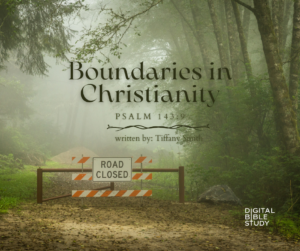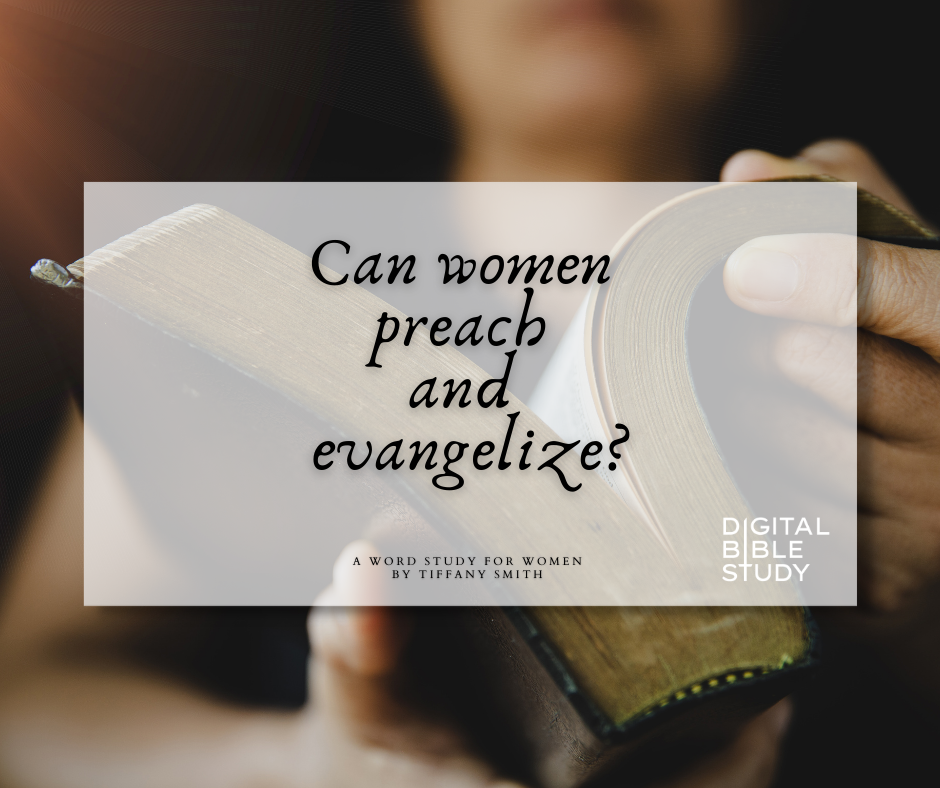Word Study for Women on Evangelism and Preaching
Introduction
The words “evangelism” and “preaching” are two words I have noticed some women struggle to apply appropriately in personal and general contexts. Perhaps, for reasons of expediency, some women would consider it best not to refer to women as evangelists or preachers, due to the connotations the religious world has adopted that refer to these as offices in church leadership held by men. But I do want us to study these words, as well as correlating words and verses to help us gain a better understanding of the meanings and contexts of these two words.
Evangelism
The word “evangelism” cannot be found in the Bible. The closest word is “evangelist,” which is only mentioned 3 times in scripture.
Let’s begin with a definition of evangelism from the Cambridge dictionary:
“the activity of persuading people to become Christians often by traveling around and telling people about your beliefs.”
Though I recognize this is a secular source, notice that even this definition does not recognize “evangelism” as an office specifically for a man, or a “preacher”.
Next, let’s look at a couple other sources for definitions of “evangelist.”
“a preacher of the gospel:—evangelist.”
Strong’s Concordance
“This name is given in the N. T. to those heralds of salvation through Christ who are not apostles.”
Thayer’s Lexicon
Now, let’s end this section by listing the important key points and words about evangelism:
- persuading people to become Christians
- preacher
- heralds of salvation
Preaching
The word “preach” is used multiple times in scripture.
Let’s walk through several of the entries from Strong’s Concordance related to the word preach. What I am hoping we can gain from these several definitions is the idea that preaching was proclaiming the gospel, which is something we, as women can do as long as we do not usurp the authority of men within worship during the assembling of the saints, which we will discuss later.
G1229
Strong’s Concordance
“to herald thoroughly:—declare, preach, signify”
Thayer’s Lexicon:
“to carry a message through, announce everywhere, through places, through assemblies of men, etc.; to publish abroad, declare”.
G2097
Strong’s Concordance
“to announce good news (“evangelize”) especially the gospel:—declare, bring (declare, show) glad (good) tidings, preach (the gospel)”
Thayer’s Lexicon
“to bring good news, to announce glad tidings…in the N. T. used especially of the glad tidings of the coming kingdom of God, and of the salvation to be obtained in it through Christ, and of what relates to this salvation.”
I also want to point out the transliteration of the entry G2097 from Strong’s Concordance: euangelizō. Did you notice that it looks similar to evangelize?
G2605
Strong’s Concordance
“to proclaim, promulgate:—declare, preach, shew, speak of, teach”
Thayer’s Lexicon
“to announce, declare, promulgate, make known; to proclaim publicly, publish.”
G2784
Strong’s Concordance
“of uncertain affinity; to herald (as a public crier), especially divine truth (the gospel):—preacher(-er), proclaim, publish”
Thayer’s Lexicon
“to be a herald; to officiate as herald; to proclaim after the manner of a herald.”
G2980
Strong’s Concordance
“to talk, i.e. utter words:—preach, say, speak (after), talk, tell, utter”
Thayer’s Lexicon
“to utter a sound…to emit a voice make oneself heard; hence to utter or form words with the mouth, to speak.”
Women in Worship
Now, I want us to take a moment to put into context where women are to keep silent.
Let’s begin in 1 Corinthians 14:34-35.
Verse 34 says,
“Let your women keep silence in the churches…”
Strong’s Concordance gives these definitions for church from entry G1577:
“a calling out, i.e. (concretely) a popular meeting, especially a religious congregation (Jewish synagogue, or Christian community of members on earth or saints in heaven or both):—assembly, church”
and Thayer’s Lexicon:
“a gathering of citizens called out from their homes into some public place; an assembly”.
We can see from these two definitions that the church refers to an assembling of people, and we understand this to be Christians. We as Christians form the church not a building in which we meet, keep this in mind. Therefore, the conclusion is that women are to be silent when Christians are coming together in assembly.
However, keep in mind the particular assembling here is referring to assembling for the act of worship. Otherwise, women would have to be silent any time Christians gathered, which we do not see examples of in scripture. Think of how much more limited our learning would be if we as women could not engage with others in an assembly for bible study!
But again, understand that the context we are seeing here in 1 Corinthians is referring to a proper assembly for worship. Many congregations actually have a separate time for Bible studies on Sundays and Wednesdays to allow women and men to engage with questions and comments about scripture to allow us to learn from one another.
Another passage about a woman’s silence is in 1 Timothy 2:11-12:
“Let the woman learn in silence with all subjection. But I suffer not a woman to teach, nor to usurp authority over the man, but to be in silence.”
So, if this is a continuation of the statement in 1 Corinthians 14, then we know that the place a woman is to keep silence is in the church (assembly of the saints), and from these verses we understand she is not to usurp the authority of men. Putting these ideas together we understand that men are to lead the assembly during worship services and women are not to come before the assembly to lead in any of the acts of worship: proclaiming a message from scripture, praying, passing out the Lord’s supper, etc.
Women Working for God
We have covered several definitions related to evangelism and preaching, and we have looked at the context of when and where women are to be silent. Now, I want to try to draw us to the conclusion that I have purposed for this article:
Women have a role in evangelizing (converting souls by sharing the gospel), preaching (proclaiming the Word), and teaching.
I notice a lot of women are okay with stating that women are to teach, but did you notice in our last scripture reference from 1 Timothy 2 that it says, “I suffer not a woman to teach”?
If we were to take that out of its context, we would think we, as women, were always to sit on the sidelines and let men be the only one to speak the truth of the gospel.
But let’s look over at 2 Timothy 2:2
“And the things that thou hast heard of me among many witnesses, the same commit thou to faithful men, who shall be able to teach others also.”
The definition of “men” in 2 Timothy 2:2 from Strong’s Concordance:
“a human being” Thayer’s Lexicon:
“universally, with reference to the genus or nature, without distinction of sex, a human being, whether male or female." We can also read in Acts 8:1-4 that members of the church were scattered abroad and particularly in verse 3 it mentions that Saul “haling men and women committed them to prison” and verse 4 continues by saying, “Therefore they that were scattered abroad went everywhere preaching the word.”
Therefore, men and women are to teach others.
Again, I understand it may not be expedient for us to go about calling women “evangelists” or “preachers,” since the connotations and misunderstandings these words hold may lead people to incorrect assumptions about you as a Christian, the church, and about its beliefs and doctrine, but I do want us as women to understand that these acts:
- evangelizing
- preaching
- teaching
are all things we can do as long as we respect the authority God has given men in the assembly of worship.

Tiffany Smith
My name is Tiffany Smith. I have been married to my husband Nathan for almost two years now.
My husband and I live near Albany, Georgia; although our original hometown is Jonesboro,
Arkansas. We worship with the Lee County church of Christ in Georgia. My husband and I both
love God, and I love seeing us grow as Christians and workers in the church. I seek to keep
myself active in studying God’s word and want to share my studies with others. So I hope you
join me for this study and others to come!

Applications of Jesus’ Example Prayer
Prayer is such an important part of our Christian walk. It is our way of communicating with our Heavenly Father. So, do not neglect it. Pray to Him. Talk to Him. Use the aspects we identified in Jesus’ example prayer to guide you in your prayers.

Are We Speaking Where the Bible Speaks? Part 1
There is an important question that needs to be addressed, and that question is “Are we speaking where the Bible speaks?”

Boundaries in Christianity
Take a moment to think on areas of your life where you may already have boundaries set to help keep yourself closer to God. Also, take some time to consider areas of weakness that you may be able to develop boundaries for to help keep you distanced from tempting situations and more focused on sticking to the path of righteousness.

